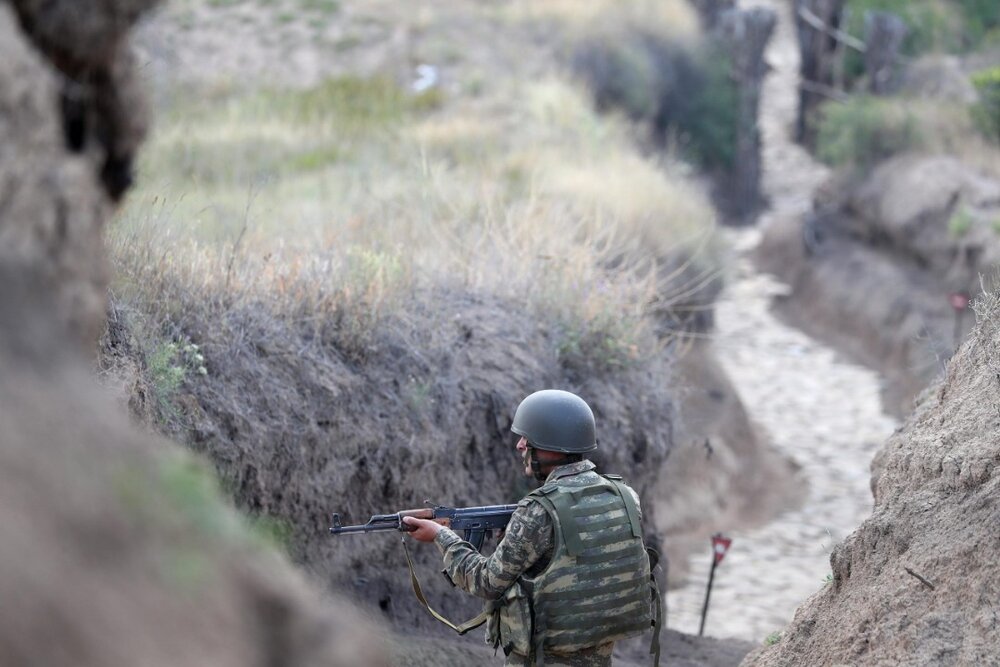Iran steps up diplomacy amid border tensions between Armenia, Azerbaijan

TEHRAN – The spiral escalation of tensions between two of Iran’s neighbors in the South Caucasus region has taken the top Iran diplomat to the region amid a decisive round of nuclear talks between Iran and world powers in the Austrian capital of Vienna.
Iranian Foreign Minister Mohammad Javad Zarif began a regional tour of the South Caucasus that included visits to Azerbaijan and Armenia. The visits began amid reports of border tensions between two rivals grappling with the consequences of a deadly 44-day war that resulted in Azerbaijan retaking large swathes of Armenian-controlled territories in the Nagorno-Karabakh region.
In mid-May, Armenia accused Azerbaijan of advancing into its southern territory. Armenian Acting Prime Minister Nikol Pashinyan has said Azerbaijan’s armed forces crossed the state border of the Republic of Armenia and advanced as far as 3.5 kilometers in Syunik province.
“This is unacceptable to the Armenian side, because it represents an encroachment on the sovereign territory of the Republic of Armenia. It still remains to be seen why such an action was possible, but it should be noted that this is an act of subversive infiltration. It should also be stated that our armed forces responded early this morning with appropriate tactical maneuvers and other necessary measures,” Pashinyan said in a meeting with Armenian military officials.
Azerbaijan rejected the Armenian account of the tensions, saying it deployed troops to areas bordering Armenia but this deployment occurred inside Azerbaijan’s territories.
The episode required a position by Iran. So, Saeed Khatibzadeh, spokesman for Iran’s Foreign Ministry, called on the two South Caucasus rivals to settle their border disputes in peaceful ways and through dialogue.
Khatibzadeh also said that Iran was “closely and sensitively following the developments” between Armenia and Azerbaijan.
Underlining Iran’s readiness to facilitate the settlement of the dispute, Khatibzadeh said, “The Islamic Republic of Iran underlines the necessity of maintaining stability and calm in the region, and calls on both sides to show restraint, avoid fueling the disagreements, and respect the two countries’ borders.”
Earlier, a senior Iranian lawmaker warned against change in Iran-Armenia borders. The lawmaker, Mojtaba Zolnouri, who serves as the head of the Iranian Parliament’s National Security and Foreign Policy Committee, said Tehran has made it clear that it will not accept any change in international borders in the region.
“If part of the territory of Armenia is to be taken and our border conditions change, that is, to have a new neighbor, it is not acceptable for us. The existing borders must be completely protected and the shared border of the Islamic Republic of Iran with Armenia must be maintained,” Zolnouri said.
During his visit to Azerbaijan and Armenia, Zarif raised the issue of borders. In Baku, the top Iranian diplomat discussed with Azeri President Ilham Aliyev issues such as border tensions between Armenia and Azerbaijan and communication corridors.
“Now you can play a historic role in bringing peace to the region,” Zarif told Aliyev, according to a statement issued by the Azerbaijani presidency.
In Yerevan, Zarif received the Armenian account of border tensions. Acting Minister of Foreign Affairs of Armenia Ara Aivazian thanked Zarif for paying a visit to Armenia during “disturbing days” in the region.
Aivazian noted, “It has been two weeks since the Azerbaijani armed forces invaded the border areas of the Republic of Armenia, trying to provoke a new escalation, which is fraught with new regional threats.”
He also said that Azerbaijan strives to create “new geopolitical realities” amid global silence towards Baku.
“Undoubtedly, this encroachment on Armenia's territorial integrity is a direct consequence of the war unleashed on September 27 last year by Azerbaijan against the people of Artsakh, their right to self-determination and life, as well as the inadequate international and regional response to Azerbaijan's actions towards endangering regional peace. Encouraged by the sense of impunity, Azerbaijan is trying to create new geopolitical realities which do not proceed from the interests of countries concerned in regional stability. In these conditions, the dialogue with our regional partners is more than important,” Aivazian pointed out.
In response, Zarif called the Caucasus a “vital region” that protection of its security is a national security issue for Iran.
Expressing concerns over the recent tensions, Zarif said Iran made efforts over the past months to peacefully settle disputes between Armenia and Azerbaijan. He called on both sides to exercise restraint, respect each other’s borders, and resolve disagreements through dialogue.
Zarif also underlined the need to respect international borders and protect the territorial integrity of countries as well as the need to refrain from changing borders as a red line outlined by Iran.
The Iranian foreign minister also met with Acting Prime Minister Nikol Pashinyan. “Our good-neighborly relations with Iran are of strategic importance. The common border with Iran has ensured the security of our country in a number of ways ever since the first years of Armenia’s independence. It is my pleasure to note that there is a similar perception in Iran about our relationship,” Pashinyan told Zarif, according to a statement issued by the Armenian acting prime minister.
